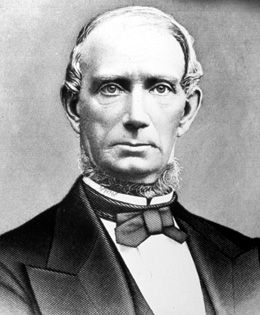On September 23, 1914, classes begin at Whitworth College in Spokane. At the instigation of Eastern Washington church leaders and Spokane railroad tycoon and developer Jay P. Graves (1859-1948) and others, the coeducational Presbyterian college is relocated from Tacoma to land Graves has donated just north of Spokane. Two distinguished new buildings housing classrooms and dormitories welcome the 40 opening-day college-level students plus seven preparatory and five unclassified students. Spokane will take Whitworth under its wing, with church, civic, and business leaders becoming trustees and donors. Unlike many church-related colleges, Whitworth will retain strong ties to its founding denomination.
George Whitworth's Legacy
The move to Spokane was the second relocation for Whitworth College, founded originally as Sumner Academy by George F. Whitworth (1816-1907) in 1883 in Sumner, Washington. In 1890 it became a college and in 1899 moved to Tacoma. There it thrived until diminishing community support and competition from nascent Pacific Lutheran University and the University of Puget Sound for students and funds caused Whitworth trustees to seek a new location.
They stipulated that, in addition to donated land, relocation to Spokane would require $100,000 for initial buildings, with the community raising $70,000 and the Presbyterian Church $30,000. The effort was successful, and soon after the opening of Whitworth in Spokane, President Donald D. MacKay, the college trustees, the Presbyterian Church, and Spokane backers launched an ambitious campaign for new buildings and an endowment.
War Years and After
During the pre-World War I Spokane years, enrollment almost doubled, facilities expanded, and Whitworth College provided its student body with a sound academic environment, a varied social life, and a strong athletic program. In addition to the liberal arts and sciences, the curriculum required Bible and theology courses, as well as daily chapel. Though it is now surrounded by suburban development, in those days the Whitworth campus was truly rural. While this isolation limited contact with the city of Spokane, it “seemed to encourage a deeper sense of family” with close comradeship among students and between students and faculty. (Soden, 43)
World War I put an end to Whitworth’s prosperity. In fact the college soon experienced such financial difficulties that it closed for the 1918-1919 academic year, renting the campus facilities to the U.S. Army Tractor School. Fortunately, the post-war era brought a renewed and enduring vigor to the school. At present (2007) Whitworth College has an enrollment of 2,400 undergraduate and graduate students attending classes on its 200-acre pine-studded campus. It will designate itself a university in July 2007.

